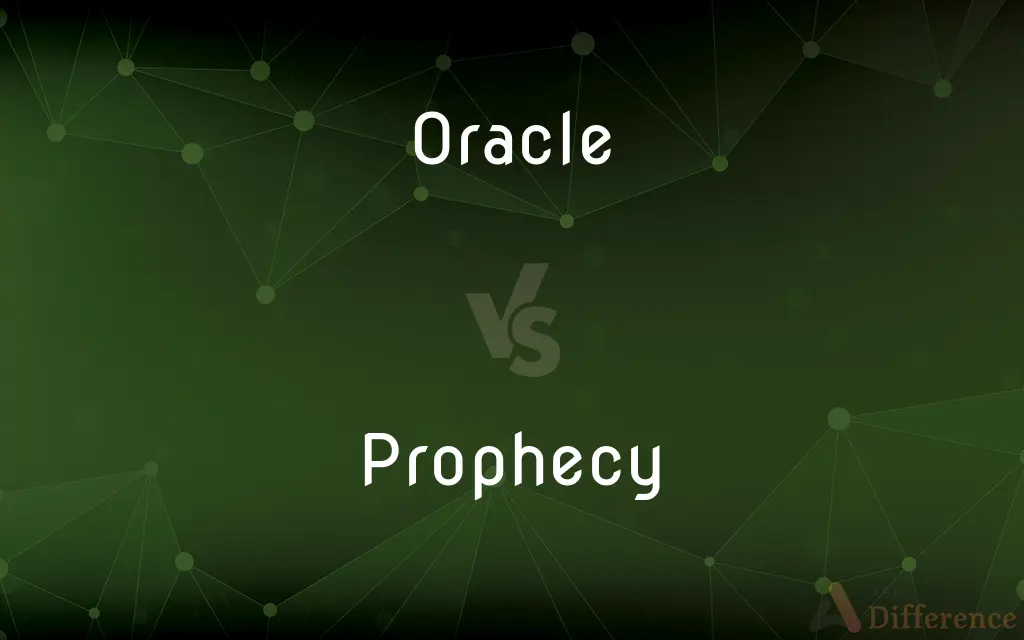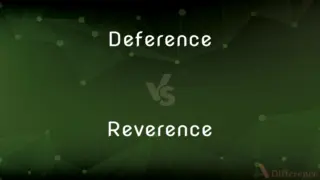Oracle vs. Prophecy — What's the Difference?
By Maham Liaqat & Fiza Rafique — Updated on April 7, 2024
An oracle refers to a person or medium delivering divine messages, while a prophecy is the message or prediction itself, often concerning the future.

Difference Between Oracle and Prophecy
Table of Contents
ADVERTISEMENT
Key Differences
An oracle is traditionally understood as a person, priest, or priestess through whom deities are believed to speak, or a sacred place where these divine communications occur. The term can also extend to any medium through which divine wisdom or foretelling is sought. On the other hand, prophecy refers to the act of predicting future events or the message that conveys these predictions, usually perceived as divinely inspired or of supernatural origin. Prophecies often carry significant weight in religious, cultural, and historical contexts, shaping beliefs and actions.
While oracles serve as the intermediaries or channels for divine messages, prophecies are the content of those messages. For instance, in ancient Greece, individuals visited the Oracle of Delphi to receive guidance or knowledge about the future, which was then delivered in the form of prophecies. This distinction underscores the relationship between the medium (oracle) and the message (prophecy), with one facilitating the delivery and the other constituting the delivered wisdom or forewarning.
The credibility and interpretation of both oracles and prophecies have been subjects of fascination and skepticism throughout history. Oracles were often respected and revered figures or places believed to have a direct line to the divine, providing crucial guidance to seekers. Prophecies, on the other hand, were scrutinized for their ambiguity, symbolism, and the extent to which they could be influenced by the interpreter or the manner of interpretation.
In literature and mythology, oracles and prophecies play pivotal roles in plot development and character destiny. Oracles often set the stage for significant events through their pronouncements, while prophecies drive the narrative forward, creating suspense, conflict, and resolution based on their anticipated fulfillment or avoidance.
The effectiveness and impact of an oracle or prophecy largely depend on the belief system of the individuals or society involved. While the authority of an oracle might be derived from their perceived connection to the divine, the power of a prophecy lies in its ability to influence thought and action among those who receive or believe in it.
ADVERTISEMENT
Comparison Chart
Definition
A person or place through which divine messages are given.
A divinely inspired prediction or message about the future.
Role
Medium or intermediary between the divine and humans.
The message or prediction itself.
Nature
Personal or localized (specific oracles or places).
Universal (messages can be relevant to many).
Function
To communicate divine wisdom or foretell events.
To inform, warn, or guide individuals or communities.
Interpretation
Often requires interpretation by the oracle themselves or by others.
Can be cryptic or symbolic, requiring careful analysis.
Compare with Definitions
Oracle
A person believed to provide answers or predictions from a divine source.
The oracle at Delphi was consulted before many ancient Greek military campaigns.
Prophecy
A prediction of future events believed to be divinely inspired.
The prophecy foretold the rise and fall of empires.
Oracle
Sometimes refers to the specific advice or prophecy given.
The oracle's warning was heeded, and the disaster was averted.
Prophecy
A message imparted by a prophet, often containing warnings.
The prophet's prophecy caused much debate among the people.
Oracle
In modern usage, can refer to an authoritative or wise source of advice.
In the tech industry, he is considered an oracle on cybersecurity.
Prophecy
Can be a vision or symbolic revelation about the future.
She had a prophecy about a great flood that would engulf the city.
Oracle
A sacred place where such divine communications are made.
Pilgrims traveled to the oracle to seek guidance for their city.
Prophecy
Sometimes used to describe a person's strong belief in the future outcome of events.
His prophecy of technological singularity is controversial.
Oracle
Any medium through which divine insight or predictions are sought.
The king used the oracle's words to make his decision.
Prophecy
In literature, a plot device that foretells a character's fate.
The hero was driven by a prophecy to undertake his quest.
Oracle
An oracle is a person or agency considered to provide wise and insightful counsel or prophetic predictions, most notably including precognition of the future, inspired by deities. As such, it is a form of divination.
Prophecy
A prophecy is a message that is claimed by a prophet to have been communicated to them by a deity. Such messages typically involve inspiration, interpretation, or revelation of divine will concerning the prophet's social world and events to come (compare divine knowledge).
Oracle
A priest or priestess acting as a medium through whom advice or prophecy was sought from the gods in classical antiquity.
Prophecy
A prediction of what will happen in the future
A bleak prophecy of war and ruin
Oracle
A response or message given by an oracle, especially an ambiguous one.
Prophecy
An inspired utterance of a prophet, viewed as a revelation of divine will.
Oracle
A shrine consecrated to the worship and consultation of a prophetic deity, as that of Apollo at Delphi.
Prophecy
A prediction of the future, made under divine inspiration.
Oracle
A person, such as a priestess, through whom a deity is held to respond when consulted.
Prophecy
Such an inspired message or prediction transmitted orally or in writing.
Oracle
The response given through such a medium, often in the form of an enigmatic statement or allegory.
Prophecy
The vocation or condition of a prophet.
Oracle
A person considered to be a source of wise counsel or prophetic opinions.
Prophecy
A prediction.
Oracle
An authoritative or wise statement or prediction.
Prophecy
A prediction, especially one made by a prophet or under divine inspiration.
French writer Nostradamus made a prophecy in his book.
Oracle
A command or revelation from God.
Prophecy
The public interpretation of Scripture.
Oracle
In the Bible, the sanctuary of the Temple.
Prophecy
A declaration of something to come; a foretelling; a prediction; esp., an inspired foretelling.
He hearkens after prophecies and dreams.
Prophecy came not in old time by the will of man.
Oracle
A shrine dedicated to some prophetic deity.
Prophecy
A book of prophecies; a history; as, the prophecy of Ahijah.
Oracle
A person such as a priest through whom the deity is supposed to respond with prophecy or advice.
Prophecy
Public interpretation of Scripture; preaching; exhortation or instruction.
Oracle
A prophetic response, often enigmatic or allegorical, so given.
Prophecy
Knowledge of the future (usually said to be obtained from a divine source)
Oracle
Something said that must come true or cannot be countermanded; an inexorable command or declaration.
Prophecy
A prediction uttered under divine inspiration
Oracle
A person considered to be a source of wisdom.
A literary oracle
Oracle
A wise sentence or decision of great authority.
Oracle
A fortune-teller.
Oracle
One who communicates a divine command; an angel; a prophet.
Oracle
(Jewish antiquity) The sanctuary, or most holy place in the temple; also, the temple itself.
Oracle
(computing theory) A theoretical entity capable of answering some collection of questions.
Oracle
(cryptocurrencies) A third-party service that provides smart contracts with information from the outside world.
Oracle
(obsolete) To utter oracles or prophecies.
Oracle
The answer of a god, or some person reputed to be a god, to an inquiry respecting some affair or future event, as the success of an enterprise or battle.
Whatso'er she saith, for oracles must stand.
Oracle
The deity who was supposed to give the answer; also, the place where it was given.
The oracles are dumb;No voice or hideous humRuns through the arched roof in words deceiving.
Oracle
The communications, revelations, or messages delivered by God to the prophets; also, the entire sacred Scriptures - usually in the plural.
The first principles of the oracles of God.
Oracle
The sanctuary, or Most Holy place in the temple; also, the temple itself.
Siloa's brook, that flow'dFast by the oracle of God.
Oracle
One who communicates an oracle{1} or divine command; an angel; a prophet.
God hath now sent his living oracleInto the world to teach his final will.
Oracle
Any person reputed uncommonly wise; one whose decisions are regarded as of great authority; as, a literary oracle.
The country rectors . . . thought him an oracle on points of learning.
Oracle
A wise pronouncement or decision considered as of great authority.
Oracle
To utter oracles.
Oracle
An authoritative person who divines the future
Oracle
A prophecy (usually obscure or allegorical) revealed by a priest or priestess; believed to be infallible
Oracle
A shrine where an oracular god is consulted
Common Curiosities
How are oracles and prophecies verified?
Verification varies by cultural, religious, and historical context, often relying on the fulfillment of the prophecies or the credibility and historical accuracy of the oracle.
Are prophecies always about the future?
Primarily, yes, but they can also include divine insight into current situations or interpretations of past events in a way that illuminates future implications.
Can a prophecy come from sources other than oracles?
Yes, prophecies can also be delivered by prophets, through dreams, visions, or other supernatural means, not limited to oracles.
What distinguishes an oracle from a prophet?
An oracle is a medium through which divine messages are received, often associated with a specific location or entity, while a prophet is a person who delivers prophecies or divine messages directly.
Do oracles still exist today?
While traditional oracles of ancient times are less common, many cultures and religions still have figures or practices through which divine guidance or predictions are sought.
How important were oracles in ancient societies?
Oracles played a crucial role in decision-making processes, from personal guidance to matters of state, and were integral to religious and cultural practices.
What impact do prophecies have on society?
Prophecies can significantly influence societal actions, beliefs, and structures, often shaping historical and religious narratives.
Can anyone interpret a prophecy?
Interpretation often requires specific knowledge or insight into the symbolic language of the prophecy, which might be confined to certain individuals or religious figures.
Is the concept of an oracle specific to any one culture?
No, various forms of oracles and divinatory practices can be found across different cultures and historical periods, each with unique characteristics.
How do prophecies influence individual behavior?
Prophecies can guide individuals’ decisions, inspire actions, instill fear or hope, and shape their perceptions of destiny or morality.
Share Your Discovery

Previous Comparison
Deference vs. Reverence
Next Comparison
Cheery vs. CheerfulAuthor Spotlight
Written by
Maham LiaqatCo-written by
Fiza RafiqueFiza Rafique is a skilled content writer at AskDifference.com, where she meticulously refines and enhances written pieces. Drawing from her vast editorial expertise, Fiza ensures clarity, accuracy, and precision in every article. Passionate about language, she continually seeks to elevate the quality of content for readers worldwide.













































